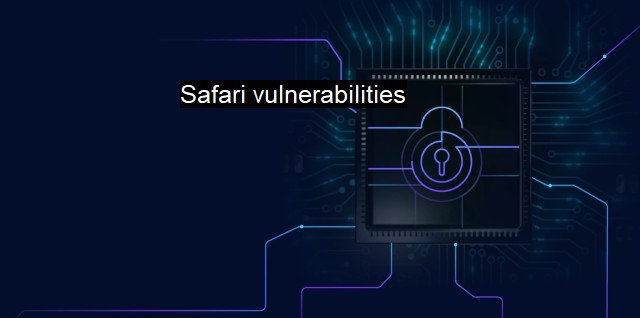What are Safari vulnerabilities?
Uncovering the Pitfalls: The Dangers of Safari Vulnerabilities and How It Threatens the Security of macOS and iOS Users
Safari vulnerabilities refer to the weak spots in the Safari browser, which could potentially be exploited by cybercriminals to infiltrate a user's computer system. Developed by Apple, Safari is a popular web browser used predominantly with iOS and macOS devices. Like any software program, Safari is susceptible to security risks that can compromise the safety of a system and the user's private data stored within it.Cybersecurity professionals and hackers alike use the term 'vulnerability' to mention gaps or weak points in a software program that could be directly or indirectly exploited. In the broadest sense, Safari vulnerabilities are the parts of the browser's software architecture that hold the potential to be exploited. these loopholes within the software may potentially allow unauthorized access, expose private data, or create an opportunity for malicious attacks.
There are numerous types of Safari vulnerabilities, with the most significant being cross-site scripting and cross-site request forgery. Cross-site scripting, also known as XSS, allows an attacker to inject malicious scripts into web pages viewed by other users, while cross-site request forgery, or CSRF, enables an attacker to trick a user into performing actions without their consent.
Consider a situation where a hacker discovers a Safari vulnerability. They could potentially use this information to craft a piece of code designed to exploit this weak spot. Once the loophole is leveraged, the malicious code might access or corrupt data, create new accounts with full user rights, and even make the affected machine or network a bot in broader schemes such as DDoS attacks, to name just a few scenarios.
Another common area where vulnerabilities tend to surface is in the handling of cookies and sessions. Improper disposal of cookies and inappropriate management of user sessions can lead to data leaks or unauthorized access to user data. Patches for these vulnerabilities are constantly developed by Apple and released as updates.
Let's talk about how these Safari vulnerabilities can impact users. For everyday users, a compromised web browser can mean the loss of personal and financial data. Credentials such as bank details, credit card numbers, and usernames/passwords can be extracted by cybercriminals. In a corporate context, platforms that are meant for internal communication may also get exposed, resulting in sensitive business-related information being stolen.
In theory, zero-day vulnerabilities are possibly the most critical of all Safari vulnerabilities. A zero-day vulnerability is a flaw in the software that is unknown to the software provider, making it a ripe avenue for attackers who discover it before the provider does.
The role of antivirus software in alleviating the danger of Safari vulnerabilities cannot be overstated. Antivirus software can ward off many potential threats by detecting and neutralizing malicious activity. Antivirus software typically identifies malicious code or activity using signatures--unique strings of code within a software program–or by behavior-based detection means.
It is also crucial that users play their part in maintaining their cybersecurity. This could be as simple as keeping their browser and underlying operating system up-to-date, using strong and unique passwords, not opening suspicious links or attachments, and regularly backing up important data.
Running cybersecurity audits helps to identify the holes in the digital defenses, allowing to understand where the risks lie better. Security researchers worldwide work tirelessly to discover these vulnerabilities and ensure that Apple patches them up via system updates in a timely manner.
Safari vulnerabilities, just like any browser vulnerabilities, pose a significant risk to user security. By being vigilant and staying informed about the ongoing threats and possible prevention measures, users can bolster their chances of maintaining a safe digital environment. Technologies like antivirus software, coupled with a thorough comprehension of why and how attacks may occur, are integral components towards achieving personal and organizational cybersecurity.

Safari vulnerabilities FAQs
What are safari vulnerabilities?
Safari vulnerabilities are security weaknesses or flaws in the Safari web browser that can be exploited by cybercriminals to gain unauthorized access to a user's system and steal sensitive information.How do I know if my Safari browser is vulnerable?
You can check for Safari vulnerabilities by regularly installing the latest updates and patches released by Apple. Also, run a reputable antivirus software on your system that can detect and alert you of any potential threats.What are the risks of ignoring Safari vulnerabilities?
Ignoring Safari vulnerabilities can lead to serious consequences, including data theft, malware infections, identity theft, and financial loss. Cybercriminals can exploit these vulnerabilities to gain unauthorized access to your system and steal sensitive information such as login credentials, credit card details, and personal data.How can I protect myself from Safari vulnerabilities?
To protect yourself from Safari vulnerabilities, always keep your browser and operating system updated with the latest patches and security updates. Additionally, use a reliable antivirus software that can detect and prevent any malicious activity on your system. Take care not to click on suspicious links or download any attachments from unknown sources. Finally, use strong and unique passwords and enable multi-factor authentication to secure your online accounts.| | A | | | B | | | C | | | D | | | E | | | F | | | G | | | H | | | I | | | J | | | K | | | L | | | M | |
| | N | | | O | | | P | | | Q | | | R | | | S | | | T | | | U | | | V | | | W | | | X | | | Y | | | Z | |
| | 1 | | | 2 | | | 3 | | | 4 | | | 7 | | | 8 | | |||||||